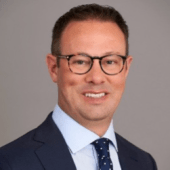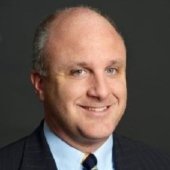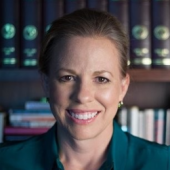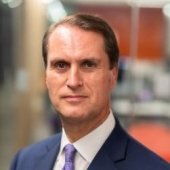IN BRIEF
- 1:50 - We say that compliance tells us what we must do; ethics tell us what we should do. It’s about beliefs and values and culture.
- 10:03 - Look at what’s going on with climate change. There is no way that climate change and global warming would be as big a subject today as it is unless we were focused, again, on identifying this connected concept of ESG.
- 11:59 - There has to be a conviction on the part of senior management that these things are important. If senior management doesn’t buy into it, forget it—it’s not going to happen. Now, senior management can’t run it, but they have to support what’s going on.
Tom Tropp is Global Chief Ethics Officer for Arthur J. Gallagher & Co., reporting directly to Chairman and Chief Executive Officer, J. Patrick Gallagher, Jr. Before joining Gallagher, Tropp was president and founder of his own insurance brokerage firm. It’s during that time that Tropp became interested in religious ethics and got his MA in the subject from University of Chicago. Tropp describes his unique role at Gallagher as a listener to the ethical concerns of the company’s nearly 40,000 employees, and has spoken to many of them personally. I sat down with Tropp to talk about what ethics means to the company and how it overlaps with ESG mandates and responsibilities.
Video transcript
Joe Kornik: Welcome to the VISION by Protiviti interview. I’m Joe Kornik, Editor-in-Chief of VISION by Protiviti, our global content resource looking into the future to examine big themes that will impact the C-suite and executive boardrooms worldwide. Today, we’re exploring the future of ESG and its strategic implications for people, process and the planet.
I’m happy to welcome Tom Tropp to the program. Tom is Global Chief Ethics Officer for Gallagher, a Rolling Meadows, Illinois–based global insurance brokerage, risk management and advisory firm helping clients address risk, protect assets and recover from losses. As global chief ethics officer, Tom says, his job is to make sure the firm is doing the things it should do. While compliance is a must-do, ethics is a should-do. Tom, thanks so much for joining me on the program today.
Tom Tropp: It’s good to be with you.
Joe Kornik: Tom, let’s start with your role as global chief ethics officer at Gallagher. What does that role entail?
Tom Tropp: Well, it’s a lot different than it is from a lot of companies. We established this position 15 years ago, and the concept is that we clarified the difference between compliance and ethics. We have a chief compliance officer who is a lawyer who reports to our general counsel, who reports to our CEO. I am the global chief ethics officer. I report directly to the CEO, and I’m dealing with issues that focus on values.
We say that compliance tells us what we must do; ethics tell us what we should do. It’s about beliefs and values and culture. When it is a legal matter, it goes to the compliance department. When it’s something to do with the values of the company, the culture of the company, it comes to me. As you can imagine, there’s a lot of crossover. I will get something that I feel, “We need to have the lawyers involved in this.” They will get something and say, “We need to have Tom handle this.” It’s been interesting. As I said, it was 15 years ago we established it. We think there have been just a small number of companies that have copied it. We know they copy it in a sense because they very often call me and say, “How do you do this? How’s this structured?” and so we think it’s a different way of approaching. It has proven to be better for us.
Joe Kornik: Is there anything you can share? I’m curious, because 15 years seems like a decent amount of time. I don’t think ethics was quite a front-burner of an issue, perhaps, back then than it is today, so anything you can share about the evolution of the role over those 15 years?
Tom Tropp: Oh, yeah, it was interesting: Pat Gallagher, if he was on the call, would tell the story: I had just joined the company as a merger partner, and I had just finished four years at the University of Chicago at the graduate school there, studying ethics. I said to Pat, “You need a chief ethics officer, and I don’t know exactly what that does, but you need to have one.” We talked for a while, and Pat said, “You know, that’s the stupidest idea I’ve ever heard. Let’s do it,” and we did it, and it’s evolved.
The initial concept was to go out into the field, visit with our branch offices. We were a much smaller company then. We had 7,000 employees in two countries. Today, we have 42,000 employees in 51 countries, so it’s a different company now, but initially, the idea was to go out and talk to our employees, ask them if they think we’re ethical, talk about ethics, what it means, and then listen to them. We called my visits listening sessions. We learned some interesting things.
Specifically, to answer your question, one of the very first things that surfaced was, we had just opened our processing center in India—a brand-new project for us. We had a couple hundred employees over there. We’ve got over 7,000 now. But we had just opened that, and I started visiting offices, and people were saying, “We think it’s unethical that you’re sending jobs to India.” I came back and talked to Pat about it, and we realized what the problem was: We weren’t sending jobs to India. We were creating facilities to make the jobs in the U.S. more efficient. We realized what had happened was that we hadn’t communicated it properly. We hadn’t focused on the fact that this was set up to improve your job. And that was a catalyst to convince us that we had some value in this and we needed to keep going. As the years have gone by, I’ll tell you, Joe, we have surfaced so many things—so many good things that I hear in the field—and so many problems. It’s very easy to address those issues when you’re reporting to the CEO/chairman of the board.
Joe Kornik: It makes it much more of a strategic role, obviously. What are some of those ethical standards and loftier goals that Gallagher has set that go above and beyond just basic compliance, and does the insurance industry present any unique challenges?
Tom Tropp: We have a document called “The Gallagher Way.” You can look it up on our website, and we invite people to read it and to use it. It’s got 25 tenets, things that we believe in. We wrote it in 1984, and it became a standard—the grounding for our company. All 25 of those things talk about what I would put into the ethics category—even a few of them that talk about sales. They talk about how to sell appropriately, ethically.
For example, number seven is, empathy for the other person is not a weakness. It’s OK to worry about each other. Some companies that we’ve read about, you’ve read about, that’s not accepted: “Go back to your desk and get to work.” Number seven is, we’re all cogs in a wheel. We’re all important. We have an award that we give to people that any employee can recommend an employee—the Cog Award—and we send them a certificate that says, you did something that made you a cog in the wheel. Those are our goals. Our goals are listed in that “Gallagher Way,” and I believe that of our over 40,000 employees, 90% of them can, if you ask them, start naming two or three of those 25.
Joe Kornik: When you think about where ethics fits into ESG, ESG has been something that has become top of mind for most business leaders over the last several years, and certainly, ESG falls into that. In general, how would you say companies are doing these days when it comes to where integrity and ethics fit into the overall ESG model?
Tom Tropp: I worry a little bit about it. Initially, when this first surfaced—the term, three, four years ago—I was asked by our board, “What is this ESG thing, and how are we supposed to focus on it?” and I said, “Our company’s over 90 years old. ESG is everything we’ve been doing for 90 years. It’s just that it never got a title.” It used to be called corporate social responsibility. Now, they have brought it together, and it’s great because it gives us a singular terminology to deal with.
Unfortunately, about every three weeks, the definition of ESG changes, and so it’s an evolving thing. I believe that it’s good. It’s a good thing we’re doing this. My fear at this point regarding ESG is that it’s going to move toward Milton Friedman instead of Ed Freeman. Milton Friedman, Nobel Prize–winning economist from the University of Chicago, his theory was called stockholder theory, and he said, “The only job of the president, of the CEO, of a publicly traded company is to grow value for the stockholders.” Ed Freeman, 15 years later, at the University of Virginia, said the same thing, but he used the word stakeholders, and he included all of the stakeholders of an organization.
My fear at what I’m seeing with ESG now is that it’s becoming driven by the investor community rather than favoring the other stakeholders. I’m afraid that it’s going to become something that is that is only focused on profit—encouraging people to buy our stock because we’re ESG-approved as opposed to encouraging people to respect us, because we’re worrying about all of those things.
Joe Kornik: Is there anything that you or other business leaders can do to ensure that they don’t fall into that trap—that they get it right?
Tom Tropp: Absolutely. We’re doing it. We’re all doing it. I am so impressed with some of the things I’m reading in the business journals about how people are focusing on this. Look at what’s going on with climate change. There is no way that climate change and global warming would be as big a subject today as it is unless we were focused, again, on identifying this connected concept of ESG. Now, in some countries—the U.K., in particular, and Australia following closely, and then Canada—it’s becoming a G as opposed to an E. It’s become, “You will do this type of thing,” and that’s fine.
That’s great, but when we survey our employees every year—we call it a culture survey—always, the first thing these folks bring up is, “What are we doing for the climate?” It’s a huge issue, and I believe companies are starting to see that among their employees and their other stakeholders—their clients, their vendors—it’s a huge issue. And my fear about the investor-community thing is real, but I’m also comforted by the fact that the other stakeholders are also focused on this and are pushing companies to respond.
Joe Kornik: You touched on a few of these, but I’m curious: What’s required? What else besides some of the things you’ve already talked about? What’s required for a company to excel in terms of its ethics and integrity? What advice would you give business leaders around what would be important for a company in order to excel in those areas?
Tom Tropp: The first, very logical, answer to that is leadership from the top. This has to go up to senior management. There has to be a conviction on the part of senior management that these things are important. If senior management doesn’t buy into it, forget it—it’s not going to happen. Now, senior management can’t run it, but they have to support what’s going on. I don’t create anything that we do. There’s people in various departments in the company who create that, but they know that they have support from someone who reports to the chairman, and that’s critical that you have to have that.
Then, you have to have a culture in the organization that encourages that circular thinking. If you don’t have that, you’re never going to get good, positive input. The stuff we learn about all of these subjects from our employees is absolutely critical. I just had a conversation yesterday: We decided we wanted to sponsor a particular organization that deals with a certain type of serious illness, so I looked for someone who was focused on that. I found someone. I talked to that person yesterday, and he totally changed my thinking on it. He said, “No, that’s not the organization you want to support. It’s this other one that is doing more important things in that area.” I said, “Fine. Do the research. Prove it to me, and then let’s go.” I never would have thought of that myself—it came from the field. There’s an amazing amount of wisdom out there in every company. You’ve just got to tap into it.
Joe Kornik: Well Tom, you’ve been incredibly generous with your time, so I appreciate that. We call this program VISION by Protiviti because we want to bring smart people together and have them look out a decade or more and give us their vision of the future and where they think this is all headed. When you think about sustainability and, specifically, ethics, any predictions about what kind of world you think we’ll be in a decade from now, or 2035, let’s say?
Tom Tropp: I could tell you what I wish would come true. We’re talking about setting our net-zero goal, and a lot of companies are doing 2050. We decided to do 2052. We haven’t announced it yet — we haven’t officially made the decision — but we think we’re going to do 2052, because that’ll be Pat Gallagher’s 100th birthday, and I figured the two of us are going to show up at the party in wheelchairs.
I don’t worry about our company in a decade or longer. We’re very focused on promoting people from within in our organization, and you don’t get promoted if you don’t buy the culture, and so I’m pretty sure we’re going to have the same type of emphasis. I am optimistic, and I find myself wondering if I’m insane when I say that, because there’s so much pessimism in the world today, but I find myself optimistic about that. I do think in spite of some of its flaws, this ESG movement is going to make a difference. People are starting to focus on these issues, and I believe companies are responding, and they’re responding on both ends—both the stockholder end and then the end with all the other stakeholders—so I’m optimistic. I sure hope I’m right.
Joe Kornik: It’s an exciting time. Businesses can lead the way on this one—perhaps even more so than they have on things in the past. I do think that this is an area where business can run with this cause and do good things.
Tom Tropp: I hope so. I hope you’re right.
Joe Kornik: Tom, thanks again for your time today.
Tom Tropp: It’s my pleasure. Always a pleasure to be involved with your group.
Joe Kornik: Thank you for watching the VISION by Protiviti interview. For Tom, I’m Joe Kornik. We’ll see you next time.
Did you enjoy this content? For more like this, subscribe to the VISION by Protiviti newsletter.































